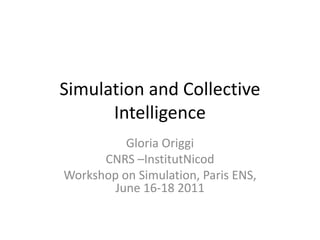
Simulation and collectiveintelligence
- 1. Simulation and Collective Intelligence Gloria Origgi CNRS –InstitutNicod Workshop on Simulation, Paris ENS, June 16-18 2011
- 2. What are Simulations? Computer simulations are a vast and heterogeneous class, which contains processes as varied as that of flying a plane, the movement of people in public transport systems, network-based computations, strategic scenarios of warfare (kriegspiele) and virtual reality scenarios of all kind Hartmann, 1996
- 6. Crop Predictions The Iowa agriculture landscape: Green areas are more productive for soy, corn, and wheat; red are least. (Lanworth Company)
- 7. Different ways of conceptualizing simulations (Hartmann) ① Simulations as a technique: Investigate the detailed dynamics of a system ② Simulations as a heuristic tool: Develop hypotheses, models and theories ③ Simulations as a substitute for an experiment: Perform numerical experiments ④ Simulations as a tool for experimentalists: Support experiments ⑤ Simulations as a pedagogical tool: Gain understanding of a process
- 8. A Fundamental Difference with Models: No need for elegance and simplicity: Data crunching by computers is so powerful that we can complexify the input data in order to obtain a better empirical adequacy.
- 9. Simulations as Building Scenarios • Scenarios are a political technique • Three requirements: – Credibility – Legitimacy – Salience
- 10. Haas/Stevens 2011: . • Credibilitymeans that the knowledge claims are believed to be accurate: within a consensus theory of truth that means that they are publicly created through a deliberative process by people widely regarded as experts. • Legitimacymeans that it is developed by people who have social authority, and that it is accepted by people outside the community that developed it. In practice this often rests on peer review and scholarly reputation. • Saliencemeans that the information is timely, and is organized on a politically meaningful time scale and scale of resolution”
- 12. My point: • Computer simulations are prediction-driven. If you cannot control the accuracy of the calculation, you can control the correctness of prediction. • In this sense, the are a special class of models that bears a strong relation with policy-making and political/economical institutions. • The questions simulations are supposed to answer aren’t always questions that raise within the scientific community, rather, they are normative charged societal questions that are put forward by a political agenda. • This raises a problem of prediction and focus. Many events have been not predicted because of a blindness of the models, that were able to answer only the top-down questions put on the table by policy makers.
- 14. Computer Simulation: The End of Theory? Chris Anderson: “The quest for knowledge used to begin with grand theories. Now it begins with massive amounts of data. Welcome to the Petabyte Age.” Petabytes allow us to say: "Correlation is enough." We can stop looking for models. We can analyze the data without hypotheses about what it might show. We can throw the numbers into the biggest computing clusters the world has ever seen and let statistical algorithms find patterns where science cannot.
- 15. Example: Google • Google spell checker doesn’t have any model of language or grammar, just correlates the number of “yes” triggered by a certain spelling. • Google translator • Craig Venter’s sequencing of entire ecosystems.
- 16. Is collective intelligence a kind of simulation?
- 24. SITES HUBS
- 33. THANK YOU! THANK YOU!
